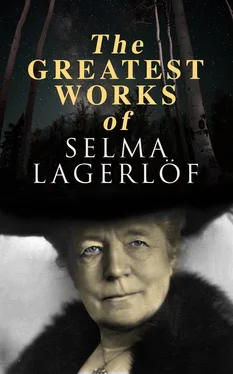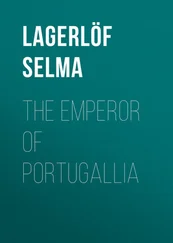"Good day to you!" said the boy. "I have heard that there's a sick horse in here. Surely it can't be you, who look so healthy and strong."
The horse turned his head and stared fixedly at the boy.
"Are you the son?" he queried. "I have heard many bad reports of him.
But you have such a good face, I couldn't believe that you were he, did
I not know that he was transformed into an elf."
"I know that I left a bad name behind me when I went away from the farm," admitted Nils Holgersson. "My own mother thinks I am a thief. But what matters it—I sha'n't tarry here long. Meanwhile, I want to know what ails you."
"Pity you're not going to stay," said the horse, "for I have the feeling that you and I might become good friends. I've got something in my foot—the point of a knife, or something sharp—that's all that ails me. It has gone so far in that the doctor can't find it, but it cuts so that I can't walk. If you would only tell your father what's wrong with me, I'm sure that he could help me. I should like to be of some use. I really feel ashamed to stand here and feed without doing any work."
"It's well that you have no real illness," remarked Nils Holgersson. "I must attend to this at once, so that you will be all right again. You don't mind if I do a little scratching on your hoof with my knife, do you?"
Nils Holgersson had just finished, when he heard the sound of voices. He opened the stable door a little and peeped out.
His father and mother were coming down the lane. It was easy to see that they were broken by many sorrows. His mother had many lines on her face and his father's hair had turned gray. She was talking with him about getting a loan from her brother-in-law.
"No, I don't want to borrow any more money," his father said, as they were passing the stable. "There's nothing quite so hard as being in debt. It would be better to sell the cabin."
"If it were not for the boy, I shouldn't mind selling it," his mother demurred. "But what will become of him, if he returns some day, wretched and poor—as he's likely to be—and we not here?"
"You're right about that," the father agreed. "But we shall have to ask the folks who take the place to receive him kindly and to let him know that he's welcome back to us. We sha'n't say a harsh word to him, no matter what he may be, shall we mother?"
"No, indeed! If I only had him again, so that I could be certain he is not starving and freezing on the highways, I'd ask nothing more!"
Then his father and mother went in, and the boy heard no more of their conversation.
He was happy and deeply moved when he knew that they loved him so dearly, although they believed he had gone astray. He longed to rush into their arms.
"But perhaps it would be an even greater sorrow were they to see me as I now am."
While he stood there, hesitating, a cart drove up to the gate. The boy smothered a cry of surprise, for who should step from the cart and go into the house yard but Osa, the goose girl, and her father!
They walked hand in hand toward the cabin. When they were about half way there, Osa stopped her father and said:
"Now remember, father, you are not to mention the wooden shoe or the geese or the little brownie who was so like Nils Holgersson that if it was not himself it must have had some connection with him."
"Certainly not!" said Jon Esserson. "I shall only say that their son has been of great help to you on several occasions—when you were trying to find me—and that therefore we have come to ask if we can't do them a service in return, since I'm a rich man now and have more than I need, thanks to the mine I discovered up in Lapland."
"I know, father, that you can say the right thing in the right way," Osa commended. "It is only that one particular thing that I don't wish you to mention."
They went into the cabin, and the boy would have liked to hear what they talked about in there; but he dared not venture near the house. It was not long before they came out again, and his father and mother accompanied them as far as the gate.
His parents were strangely happy. They appeared to have gained a new hold on life.
When the visitors were gone, father and mother lingered at the gate gazing after them.
"I don't feel unhappy any longer, since I've heard so much that is good of our Nils," said his mother.
"Perhaps he got more praise than he really deserved," put in his father thoughtfully.
"Wasn't it enough for you that they came here specially to say they wanted to help us because our Nils had served them in many ways? I think, father, that you should have accepted their offer."
"No, mother, I don't wish to accept money from any one, either as a gift or a loan. In the first place I want to free myself from all debt, then we will work our way up again. We're not so very old, are we, mother?" The father laughed heartily as he said this.
"I believe you think it will be fun to sell this place, upon which we have expended such a lot of time and hard work," protested the mother.
"Oh, you know why I'm laughing," the father retorted. "It was the thought of the boy's having gone to the bad that weighed me down until I had no strength or courage left in me. Now that I know he still lives and has turned out well, you'll see that Holger Nilsson has some grit left."
The mother went in alone, and the boy made haste to hide in a corner, for his father walked into the stable. He went over to the horse and examined its hoof, as usual, to try to discover what was wrong with it.
"What's this!" he cried, discovering some letters scratched on the hoof.
"Remove the sharp piece of iron from the foot," he read and glanced around inquiringly. However, he ran his fingers along the under side of the hoof and looked at it carefully.
"I verily believe there is something sharp here!" he said.
While his father was busy with the horse and the boy sat huddled in a corner, it happened that other callers came to the farm.
The fact was that when Morten Goosey-Gander found himself so near his old home he simply could not resist the temptation of showing his wife and children to his old companions on the farm. So he took Dunfin and the goslings along, and made for home.
There was not a soul in the barn yard when the goosey-gander came along. He alighted, confidently walked all around the place, and showed Dunfin how luxuriously he had lived when he was a tame goose.
When they had viewed the entire farm, he noticed that the door of the cow shed was open.
"Look in here a moment," he said, "then you will see how I lived in former days. It was very different from camping in swamps and morasses, as we do now."
The goosey-gander stood in the doorway and looked into the cow shed.
"There's not a soul in here," he said. "Come along, Dunfin, and you shall see the goose pen. Don't be afraid; there's no danger."
Forthwith the goosey-gander, Dunfin, and all six goslings waddled into the goose pen, to have a look at the elegance and comfort in which the big white gander had lived before he joined the wild geese.
"This is the way it used to be: here was my place and over there was the trough, which was always filled with oats and water," explained the goosey-gander.
"Wait! there's some fodder in it now." With that he rushed to the trough and began to gobble up the oats.
But Dunfin was nervous.
"Let's go out again!" she said.
"Only two more grains," insisted the goosey-gander. The next second he let out a shriek and ran for the door, but it was too late! The door slammed, the mistress stood without and bolted it. They were locked in!
The father had removed a sharp piece of iron from the horse's hoof and stood contentedly stroking the animal when the mother came running into the stable.
Читать дальше












